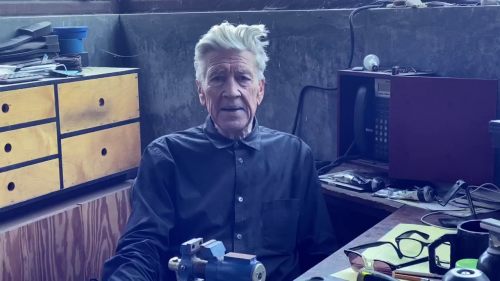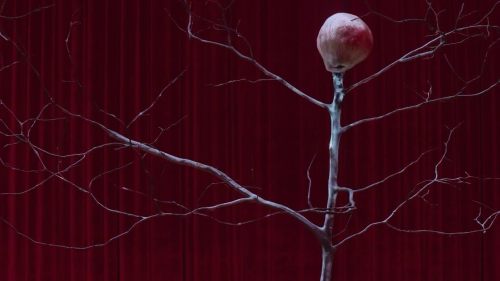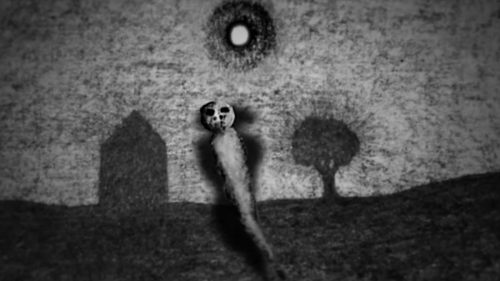Hollywood Horrors And Multiple Identities In MULHOLLAND DRIVE
Us is in theaters this week. Get your tickets now!
The idea of multiple identities is pervasive and recurrent in David Lynch’s Mulholland Drive. The film itself is an uncommon amalgamation of television pilot and scraped-together cinema, existing both as a rejected open-ended project for serialization and as a nebulous whole that is open to interpretation, reinterpretation, and misinterpretation. It’s a film that has a plethora of potential meanings, with potentially none of them being the correct one in the mind of David Lynch. What is apparent, however, are the running motifs of performance and identity that run throughout the film, exposing a sort of Hollywood horror story that, at least in my mind, reads as impersonally universal as it is intimately personal.
Hollywood is, as Betty (Naomi Watts) calls it, a dream place, which she means to state an idyllic contrast to her rural roots and humble beginnings. For Rita (Laura Elena Harring), though, the city is a near-literal dream, as her lost memory leaves her experiencing the world with new eyes and fresh perspective. These women meet through the fortuitous happenstance of the amnesiac stumbling into the borrowed dwelling of the wannabe actress, but their perspectives complement one another in the sense that they are naïve to the world they live in. Rita’s previous role in Hollywood is a mystery left (somewhat) unresolved, but Betty exists tangentially to a venomous world of treating actresses as capital, where director Adam Kesher (Justin Theroux) is strong-armed by ominously inhuman producers to cast a specific woman as the lead in his film, regardless of merit or whether she fits the role.
How Betty fits into this world is revealed not long after Kesher becomes resigned to his fate in what to this point has been a largely disconnected B-story. Betty runs lines with Rita in a scene that exposes the thin line between Lynch’s stilted, soap-operatic direction and the melodrama of the script Betty is about to audition for. The lines between the levels of fiction are initially blurred to draw attention to this similarity, but as the camera pulls back to reveal Rita is reading from a script, it becomes apparent that this is what Lynch is portraying as naturalistic, that either the world of his characters is naturally stilted or the world of melodrama is truly reflective of reality.
However, when Betty goes to the actual audition, her demeanor changes for the scene. No longer is she stiff and reading the lines literally, but she is leaning into her co-lead, seducing him with lines that on their face are meant to signify fear and desperate self-defense. Betty actually starts acting, demonstrating an ability to adopt an identity other than her own, possibly even to tap into a more real part of herself than the unnatural pleasantries she espouses in every other daily interaction. After all, she has already proven herself duplicitous with her willingness to lie to her aunt and to her aunt’s landlord in altruistic assistance to Rita, so it’s not so much of a stretch to think that Betty has more personal depth than can be taken at face value. Perhaps it is this depth that Kesher sees in Betty as they share a meaningful look in the moments before he is forced to pick the woman his producers thrust upon him.
Taking Rita in disguise out in public – a disguise that makes the two women look very similar to one another immediately after the pair shared an intimate sexual experience – Betty and Rita follow a lead on Rita's true identity to Club Silencio, where all the music is recorded, but the performances are still live. Again, Lynch comments on the nature of performance as the singer on stage gives a stunning rendition of Roy Orbison’s “Crying” in Spanish, only to collapse partway through and for the song to keep playing. The performance was a fake, but the emotion Betty, Rita, and we the audience felt from that fakery was real, though the unreality of the performance is horrifying once it is revealed. It’s no coincidence, I think, that this scene is the direct precursor to Mulholland Drive’s infamous narrative shift, in which Betty becomes the actress Diane, and Rita becomes Camilla, the woman Kesher was forced to pick as his film’s lead.
Reality has shifted so that both women are actresses and have an established relationship as lovers, and both are working on Kesher’s film. Camilla is now beloved by Kesher, and Diane is overcome by simultaneous professional and personal jealousy, strung along by Camilla’s casual romanticism but persistently publicly jilted in favor of Camilla’s more heteronormative pursuits. For all we know, Camilla might very well have been who Rita symbolically was before losing her memory, just as Diane could be who Betty was to become, a talented actress forever doomed to play second fiddle to women whom producers illogically lust after. The acting loses its artificiality as Diane loses her grip on reality, and the reality of the film disintegrates before our eyes, leaving us with questions of who Betty, Diane, Rita, and Camilla are in relation to one another, whether they occupy the same reality at all, or whether the notion of reality even matters in the face of the horrors of daily performance.
Look, because my name is not David Lynch, I could never pretend to completely understand what is happening in Mulholland Drive. The pieces are too numerous, the construction too abstract, the mind behind it all too surreal. I can only tell you what I see. And at least part of what I see in Mulholland Drive is a deconstruction of Hollywood fakery. I see women living multiple lives, as performers on screen, performers in life, and archetypes of professional success and failure to be lived and relived in the personas of actresses who will never even meet one another. In a system where women are used and consumed under the illusion of meritocracy but are ultimately chosen arbitrarily and without care, actresses become interchangeable and lose any sense of identity they may once have had. Betty and Diane become close to one another to the point of physical emulation, but they are torn apart by the personas they are doomed to adopt as Diane and Camilla, whose love is corrupted by the very institution that thrives on their talents. Whether characters or real people, human interaction is all just performance in its own right, and the terror of Mulholland Drive is that Hollywood uncaringly consumes all those permutations and wipes clean any sense of individual identity. The multiplicity of self becomes selflessness. Diane kills herself in another psychotic sacrifice to drama, and Betty is lost forever to the ether. And in the face of losing one’s identity to the multitudinous machine, reality itself loses all meaning.



